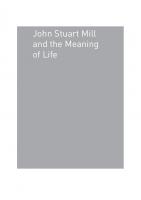Autobiography of John Stuart Mill: Published from the Original Manuscript in the Columbia University Library 9780231878715
The autobiography of the 19th century British philosopher and politician, most widely known for his views on liberty and
241 34 12MB
English Pages 240 [248] Year 2019
Preface
A Chronology of Mill's Life and Writings
Chapter I. Childhood and Early Education
Chapter II. Moral Influences in Early Youth. My Father's Character and Opinions
Chapter III. Last Stage of Education and First of Self-Education
Chapter IV. Youthful Propagandism. The West-Minster Review
Chapter V. A Crisis in My Mental History. One Stage Onward
Chapter VI. Commencement of The Most Valuable Friendship of My Life. My Father's Death. Writings and Other Proceedings Up to 1840
Chapter VII. General View of The Remainder of My Life
Index
Recommend Papers

- Author / Uploaded
- John Jacob Coss
File loading please wait...
Citation preview
AUTOBIOGRAPHY OF JOHN STUART MILL
AUTOBIOGRAPHY OF
OHN STUART
MILL
P U B L I S H E D FROM T H E O R I G I N A L M A N U S C R I P T IN T H E COLUMBIA UNIVERSITY WITH
A PREFACE
J O H N JACOB
LIBRARY BY
COSS
C O L U M B I A U N I V E R S I T Y PRESS, NEW YORK
This book was reissued in 1944 as a memorial to John Jacob Coss, 1884-1940 Moore Collegiate Professor Columbia University
Copyright © 192+, Columbia University Press, New York T h i r d Printing and Columbia Paperback Edition 1960 M a n u f a c t u r e d in the United States of America
PREFACE T E R E M Y B E N T H A M , John Stuart Mill, and John J Morley in their life dates cover the period from the middle of the Eighteenth Century to the present day. The American Revolution, the French Revolution, English Reform, and the World War are all included in these dates, as in the transformation of the Western World into a civilization predominantly industrial. Mill grew out of Bentham. Mill and Morley worked together for many years. All show that ability to combine great learning and scholarship with keen insight into contemporary affairs which has been one of the chief glories and ornaments of public life in England. Mill's Autobiography shows, as few books can, the growth of a man in the midst of his age. In many ways it is primarily an account of the social history of England in the first three quarters of the Nineteenth Century. Yet it is the personal though dispassionate story of the conflict of an integrated spirit with ideas and with the affairs of men. One sees an age, and one sees a man; and both man and age are so a part of our own day that by knowing them we learn to know ourselves. The text as printed in this volume has been taken from a manuscript of the Autobiography recently given to Columbia University by members of the Department of Philosophy. It has been considered desirable, as the definitive printing of Mill's own hand, accurately to follow the varying capitalization and punctuation of the manuscript, and in this form this version of the Autobiography is commended to its readers. It seems evident that this manuscript is the final draft intended for publication, because of the state-
TR6FJCS
VI
ment by Miss Helen Taylor, written by herself and attached to the manuscript, as follows: "Autobiography of J. S. Mill written by himself. T o be published without alterations or omissions within one year after my death. HELEN
TAYLOR."
The editorial work required was undertaken by Mr. Roger Howson, Assistant Librarian of Columbia University. JOHN J. COLUMBIA July,
UNIVERSITY 1914..
Coss
A CHRONOLOGY OF MILL'S LIFE AND WRITINGS Born at Pentonville, London M a y 20, 1806 Introduced by his father to the study o f political economy 1819 In France with Sir Samuel Bentham 1820-21 C l e r k in Examiner's Office, East India Company 1822 Formed " Utilitarian Society "
1822
Period o f disillusionment Published political views in Examiner,
1826 PROSPECTS IN
FRANCE
1830
EDITED THE L O N D O N
REVIEW
EDITED
THE
AND
OWNED
1835
LONDON
AND
WESTMINSTER
REVIEW A
SYSTEM
1836-40
OF
LOGIC,
RATIOCINATIVE
AND
INDUCTIVE
1843
P R I N C I P L E S OF P O L I T I C A L E C O N O M Y
1848
Married M r s . Harriet Hardy T a y l o r
1851
THE
ENFRANCHISEMENT
OF W O M E N
1853
Retired f r o m East India Company
1858
Death o f Mrs. M i l l
1858
D I S S E R T A T I O N S A N D DISCUSSIONS ON
1859-75
LIBERTY
1859
CONSIDERATIONS
ON
REPRESENTATIVE
GOVERNMENT
1861
UTILITARIANISM
1863
Elected to Parliament f r o m Westminster
1865
AN
EXAMINATION
OF
SIR
WILLIAM
HAMILTON'S
PHILOSOPHY AUGUSTE
COMTE
1865 AND
POSITIVISM
1865
D e f e a t e d in election, retired f r o m Parliament and w e n t to A v i g n o n THE
SUBJECTION
OF
WOMEN
1869
Died at A v i g n o n
1873
A U T O B I O G R A P H Y , edited by NATURE, THE THREE
UTILITY
E S S A Y S ON
1868
Helen
Taylor
OF R E L I G I O N , T H E I S M , RELIGION
1873 BEING 1874
JOHN S T U A R T MILL CHAPTER CHILDHOOD
I
AND
I
EARLY
EDUCATION.
T seems proper that I should prefix to the following biographical sketch, some mention of the reasons which have made me think it desirable that I should leave behind me such a memorial of so uneventful a life as mine. I do not for a moment imagine that any part of what I have to relate can be interesting to the public as a narrative, or as being connected with myself. But I have thought that in an age in which education, and its improvement, are the subject of more, if not of profounder study than at any former period of English history, it may be useful that there should be some record of an education which was unusual and remarkable, and which, whatever else it may have done, has proved how much more than is commonly supposed may be taught, and well taught, in those early years which, in the common modes of what is called instruction, are little better than wasted. It has also seemed to me that in an age of transition in opinions, there may be somewhat both of interest and of benefit in noting the successive phases of any mind which was always pressing forward, equally ready to learn and to unlearn either from its own thoughts or from those of others. But a motive which weighs more with me than either of these, is a desire to make acknowledgment of the debts which my intellectual and moral development owes to other persons j some of them of recognized eminence, others less known than they deserve to be, and the one to whom most of all is due, one whom the world had no opportunity of knowing. The reader whom these things do not interest, has only himself
2
J0H2Ì
STUART
¿MILL
to blame if he reads farther, and I do not desire any other indulgence f r o m him than that of bearing in mind, that f o r him these pages were not written. I was born in L o n d o n , on the 20th of M a y , 1806, and was the eldest son of James M i l l , the author of the History of British India. M y father, the son of a petty tradesman and ( I believe) small farmer, at Northwater Bridge, in the county of Angus, was, when a boy, recommended by his abilities to the notice of Sir John Stuart, of Fettercairn, one of the Barons of the Exchequer in Scotland, and was, in consequence, sent to the University of Edinburgh at the expense of a f u n d established by L a d y Jane Stuart (the w i f e of Sir John Stuart) and some other ladies f o r educating young men f o r the Scottish Church. H e there went through the usual course of study, and was licensed as a Preacher, but never followed the profession; having satisfied himself that he could not believe the doctrines of that or any other Church. F o r a f e w years he was a private tutor in various families in Scotland, among others that of the Marquis of T w e e d d a l e ; but ended by taking up his residence in L o n don, and devoting himself to authorship. N o r had he any other means of support until 1 8 1 9 , when he obtained an appointment in the India House. In this period of my father's l i f e there are two things which it is impossible not to be struck with: one of them unfortunately a very common circumstance, the other a most uncommon one. T h e first is, that in his position, with no resource but the precarious one of writing in periodicals, he married and had a large f a m i l y ; conduct than which nothing could be more opposed, both as a matter of good sense and of duty, to the opinions which, at least at a later period of life, he strenuously upheld. T h e other circumstance is the extraordinary energy which was required to lead the l i f e he led, with the disadvantages under which he laboured f r o m the first, and with those which he brought upon himself by his marriage. It would have been no small thing,
CHILDHOOD
6UC^TlO^(
5
consisted in the books I read by myself, and my father's discourses to me, chiefly during our walks. From 1 8 1 0 to the end of 1 8 1 3 we were living in Newington Green, then an almost rustic neighbourhood. M y father's health required considerable and constant exercise, and he walked habitually before breakfast, generally in the green lanes towards Hornsey. In these walks I always accompanied him, and with my earliest recollections of green fields and wild flowers, is mingled that of the account I gave him daily of what I had read the day before. T o the best of my remembrance, this was a voluntary rather than a prescribed exercise. I made notes on slips of paper while reading, and f r o m these, in the morning walks, I told the story to him 5 f o r the books were chiefly histories, of which I read in this manner a great number: Robertson's histories, H u m e , Gibbon; but my greatest delight, then and f o r long afterwards, was Watson's Philip the Second and Third. T h e heroic defence of the Knights of Malta against the Turks, and of the revolted provinces of the Netherlands against Spain, excited in me an intense and lasting interest. Next to Watson, my favourite historical reading was Hooke's History of Rome. Of Greece I had seen at that time no regular history, except school abridgments and the last two or three volumes of a translation of Rollin's Ancient History, beginning with Philip of Macedon. But I read with great delight Langhorne's translation of Plutarch. In English history, beyond the time at which H u m e leaves off, I remember reading Burnet's History of his Own Time, though I cared little f o r anything in it except the wars and battles; and the historical part of the Annual Register, from the beginning to about 1 7 8 8 , when the volumes my father borrowed f o r me from M r . Bentham left off. I felt a lively interest in Frederic of Prussia during his difficulties, and in Paoli, the Corsican patriot; but when I came to the American war, I took my part, like a child as I was (until set right by my father) on the wrong side, because it was called the
6
JOHN. STUJRT
MILL
English side. In these frequent talks about the books I read, he used, as opportunity offered, to give me explanations and ideas respecting civilization, government, morality, mental cultivation, which he required me afterwards to restate to him in my own words. H e also made me read, and give him a verbal account of, many books which would not have interested me sufficiently to induce me to read them of myself: among others, Millar's Historical View of the English Government, a book of great merit for its time, and which he highly valued} Mosheim's Ecclesiastical History, McCrie's Life of John Knox, and even Sewel's and Rutty's Histories of the Quakers. H e was fond of putting into my hands books which exhibited men of energy and resource in unusual circumstances, struggling against difficulties and overcoming them: of such works I remember Beaver's African Memoranda, and Collins's account of the first settlement of New South Wales. Two books which I never wearied of reading were Anson's Voyage, so delightful to most young persons, and a Collection (Hawkesworth's, I believe) of Voyages round the World, in four volumes, beginning with Drake and ending with Cook and Bougainville. Of children's books, any more than of playthings, I had scarcely any, except an occasional gift from a relation or acquaintance: among those I had, Robinson Crusoe was preeminent, and continued to delight me through all my boyhood. It was no part however of my father's system to exclude books of amusement, though he allowed them very sparingly. Of such books he possessed at that time next to none, but he borrowed several for me; those which I remember are the Arabian Nights, Cazotte's Arabian Tales, Don Quixote, Miss Edgeworth's "Popular Tales," and a book of some reputation in its day, Brooke's Fool of Quality. In my eighth year I commenced learning Latin, in conjunction with a younger sister, to whom I taught it as I went on, and who afterwards repeated the lessons to my
CHILT>HOOT>






![John Stuart Mill [1 ed.]
9786053601401](https://ebin.pub/img/200x200/john-stuart-mill-1nbsped-9786053601401.jpg)
![John Stuart Mill [1 ed.]
9786053601401](https://ebin.pub/img/200x200/john-stuart-mill-1nbsped-9786053601401-z-6191446.jpg)

